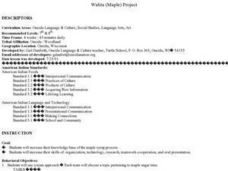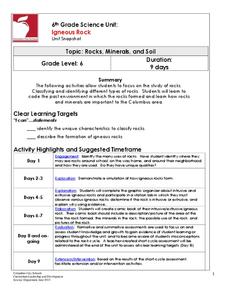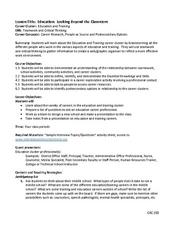Curated OER
Summarizing
Students use their note-taking skills to write summaries of information. In this writing skills instructional activity, students use the notes they have taken in another instructional activity to write adventure stories by implementing...
Curated OER
Recording the Deed: Note-Taking on Heroes
Students prepare to write summaries of heroes. In this note-taking instructional activity, students listen to a guest speaker discuss the attributes of unsung heroes and take Cornell method notes.
Curated OER
Regulation - Human Nervous and Endocrine Systems
High schoolers explore homeostasis within the nervous and endocrine system with this Smart Board activity. For this biology lesson plan, students will fill in the know and want to know sections of a KWL chart as a class...
Curated OER
What's Holding Up the Water?
Students read about the history and locate dams in Arizona. In this Arizona dams lesson plan, students write a summary about what they read focusing on word choice, ideas, conventions, and geography content.
Curated OER
Major and Minor Characters
In this reading worksheet, students complete a chart about two characters from a book. Information includes the character names, how they look, how they act, how they interact with others, and how the student might relate to them.
Curated OER
Design a Book Cover
Class members take on the role of graphic designer and craft a cover for a book they are reading. Individuals formulate a proposal outlining the images they will use to not only grab the interest of readers, but hint at the mood and...
Teach Engineering
Rube Goldberg and the Meaning of Machines
A Rube Goldberg machine does not really look like it would make work easier. Introduce your class to Rube Goldberg with a resource that shows how his inventions make simple tasks harder to complete.
Curated OER
Penguin Paradise
First graders discover where penguins live, what they look like, what kinds of food they eat, and other interesting facts. They communicate statements of information through the composition of a one paragraph summary about a penguin.
Curated OER
Summarizing with Eeyore
Third graders summarize a selected piece of nonfiction text. After reviewing the correct way to use information to summarize, 3rd graders read a nonfiction article about author A.A. Milne. They write a summary paragraph using the process...
Curated OER
Wahta (Maple) Project
Young scholars increase their knowledge base of the maple syrup process and increase their skills of organization, technology, research, teamwork-cooperation, and oral presentation. Students use a team approach to choose a topic...
Curated OER
Who Should Do It?
Middle schoolers identify the four sectors of the economy and give examples of their responsibilities. They describe how a mission statement identifies the focus of a foundation.
Curated OER
Family Forms and Family Life Cycle
There are so many different types of families, and each family functions in a different way. Discover the different roles, responsibilities, and relationships that develop in different family types. The lesson provides you with five...
Intel
Forensics: Get a Clue
Although the methods are all scientific, forensic science was started by police officers rather than scientists, who relied on observation and common sense. Young detectives use many tools to solve crimes around the school in a...
Curated OER
What Is Natural?
Your junior highers will learn about which objects are natural and classify objects as abiotic or biotic. Your class will trace human products to their natural resources using matter cycles and then create their own definition of nature.
Curated OER
Bill of Rights
Young scholars work in collaborative groups to research an amendment of the Bill of Rights. They then design and present a skit that demonstrates and communicates the core values and concepts of the amendment to the class.
Columbus City Schools
Cell-abrate!
Lights, camera, action! With the cell at center stage, guide your seventh grade biologists through the tiny drama that plays out within every living thing. Then, enjoy the show as they portray the organelles they've studied—a performance...
Columbus City Schools
Igneous Rock
These rocks are HOT! Well, they used to be, anyway. Take young geologists on a two-week journey through the life and times of the average igneous rock. Lab groups work together to hypothesize about intrusive and extrusive igneous...
Curated OER
Plot Diagram
In this plot diagram worksheet, students fill in a diagram: introduction, rising action, climax, falling action and resolution. Worksheet is designed to be used with an interactive whiteboard.
Curated OER
Lesson Ideas for Comparing and Contrasting Content
Here are three lesson ideas to help students learn how to compare and contrast information in any content area
Curated OER
Reading Worksheet
In this reading activity, learners read a given portion of a book, summarize the information, select vocabulary words, write questions and answers about the reading, and draw an illustration of their favorite part. Students complete...
Oakland Unified School District
Class Animal Report
Whether preparing your second graders for an expository writing proficiency assessment or just planning on introducing the writing process, this 37-page packet is for you. The unit has everything you need from scripted lessons to...
Curated OER
Fashion Strategies
Discover fashion terms with your class, they will design details while examining the top designers and world fashion centers. Among the topics discussed are: marketing, specializing, and designer labeling. To complete the assignments,...
Curated OER
Mayan Myths/Folktales
Middle schoolers work on summarizing a story, and they determine if it is a legend, a myth, or a fable. Working in groups to read and summarize stories, they then list evidence whether the tale is a myth, fable, or...
Curated OER
Education: Looking Beyond the Classroom
To better understand what it takes to work in the field of training or educating, learners first explore the education career cluster. After they research the cluster, pupils write questions for a guest speaker. This speaker can be from...























